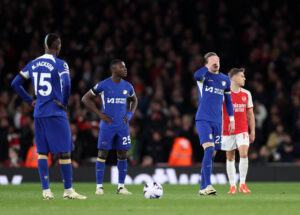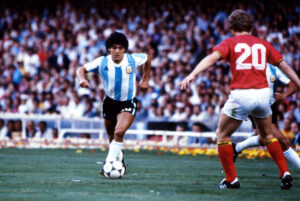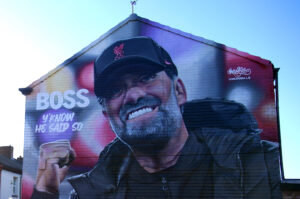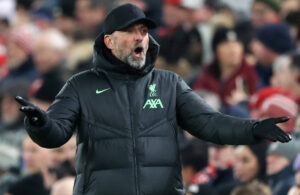And so, having considered the finest tournaments and the finest finals in the history of the European Championships, we come to the most important category – the finest European Championship-winning teams. Three of them also won the World Cup to go alongside their European crown, and the finest of them all actually won two European Championships and a World Cup in a row, in the process becoming arguably the greatest international team of all time.
Here, then, are the Five finest European Championship-winning teams, in ascending order.
The Finest European Championship Winners
5. Holland 1988
Holland 1988 may be the finest European Championship team that the Netherlands has ever produced, but most football observers (especially in Holland itself) would argue that they will still always play second fiddle to the great Dutch side of the 1970s. They, of course, were the inventors and masters of total football, the team of the two Johans (Cruyff, obviously, but Johan Neeskens is another all-time great) and the side that reached two World Cup finals in a row. The second time, in 1978, they were the team of only one Johan, as Cruyff, fearing that he or his wife might be kidnapped in Argentina after they had almost been kidnapped in Barcelona a few months earlier, withdrew from the tournament.
Of course, the big difference between the great Dutch side of the 1970s and the great Dutch side of 1988 is that the latter actually won. They may not have had the unsurpassed all-round brilliance of the 1974 team, but they were still a superb outfit, with three all-time greats of their own in Frank Rijkaard, Ruud Gullit and Marco van Basten. And the latter two scored the goals in the 2-0 win against the USSR that sealed the tournament victory.
Of course, there is one man who links both the great Dutch sides of those two decades – manager Rinus Michels. Having been the original coach of the Ajax side that won three European Cups in a row between 1971 and 1973, he then led the Dutch national side to the 1974 World Cup final. However, having lost that final to hosts West Germany, it seemed that Michels would never win the major international team prize that his brilliant – indeed, revolutionary – coaching merited. Thankfully, he returned to coach the Netherlands again in the late 1980s, culminating in the 1988 European Championship win. As a result, his could be said to be the second greatest managerial comeback in football history, after that of Matt Busby, who almost literally rose from the dead in Munich to lead Manchester United to European Cup glory ten years later.
4. France 1984
When Paolo Rossi died in December last year, one of the most powerful tributes paid to him was by La Gazetto dello Sport, which said he was “the one who beat Zico’s Brazil, Maradona’s Argentina, Boniek’s Poland and in the final the Germany of Rummenigge”. That roll-call of great players and the great teams they led is a testimony to the fact that in the early to mid-1980s there were arguably more truly great international teams than at any other time in football history. And that is without even including Michel Platini’s France, who Rossi’s Italy did not encounter on their way to victory in the 1982 World Cup in Spain in 1982 but who were nonetheless a match for any of the teams that La Gazetto dello Sport mentioned.
Unlike Rossi’s Italy and Maradona’s Argentina, Platini’s France did not win a World Cup, but at least they won a major international tournament. That was Euro 84, which they won on home soil, in probably the greatest European Championship tournament ever. Despite their brilliance, some carped that they were merely a great midfield rather than a great team. However, even if that were true, they were such a great midfield that they were almost like a whole team in four players: Luis Fernández, one of the most creative defensive midfielders ever; Jean Tigana, the diminutive midfield Napoleon who knitted the whole team together; Alain Giresse, France’s equivalent of Martin Peters in his ability to ghost into the opponent’s box to score; and, above all, Michel Platini, captain, figurehead and fantasista (as his Italian forebears would have proclaimed him).
Platini’s name may be mud – or even merde – now, after his time at the top of world football with Sepp Blatter. However, that should not detract from Platini the player, who is second only to Zinedine Zidane as France’s greatest ever player, and one of the greatest goal-scoring and goal-making midfielders that any country has ever produced.
3. France 2000
France 2000 went one better than France 84 in becoming World Champions and European Champions simultaneously. They actually won the World Cup first, on home soil in 1998. However, many of the team that doubled up in 2000, including defensive lynchpin Laurent Blanc, argued that the 2000 European Championship victory was the greater of the two triumphs, simply because of the greater competition that they faced. As Blanc often pointed out, to win the World Cup in 1998 they defeated Paraguay, Italy, Croatia and Brazil (sans Ronaldo, or at least a fit Ronaldo) in the knockout stages, whereas winning Euro 2000 meant beating Spain, Portugal and Italy in the last eight, the last four and the final respectively, and that is without even considering the tough matches they won against fine Czech and Denmark sides in the first round.
Zinedine Zidane was undoubtedly first amongst equals in the great France side of 1998-2000, but some of the other French players were all-time-greats themselves. Indeed, France 2000 were arguably better than France 1998, because in Thierry Henry, Sylvain Wiltord and David Trezeguet they had the strikers that the 1998 side, whose main striker was the relatively undistinguished Stéphane Guivarc’h, lacked. Allied to a back four of Blanc, Desailly, Thuram and Lizarazu that is arguably the best back four that any international side ever has fielded, it is clear that France 2000 were a truly great team.
However, even their achievements are still not enough to merit inclusion in the top two on this list – the two finest European Championship-winning teams ever.
2. West Germany 1972
West Germany almost achieved the remarkable hat-trick of winning three major international tournaments – two European Championships and one World Cup – in a row nearly 30 years before Spain finally achieved it (and more on them very shortly). However, they fell at the final hurdle in the European Championship final in 1976, when Antonin Panenka scored the original Panenka (chipped penalty) in the original international penalty shootout, allowing Czechoslavia to defeat West Germany and clinch their only major international crown.
There are many in Germany, especially older football fans, who argue that the 1972 European Championship-winning side was actually better than the side that would go on to win the World Cup two years later, for the simple reason that it contained Gunter Netzer. Dubbed ‘The German George Best’ because of his incredible close control and dribbling ability, the midfielder ran Alf Ramsey’s England ragged at Wembley en route to the final, before playing a major role in the final itself as West Germany comfortably beat the USSR in Brussels.
Nevertheless, to concentrate on Netzer, who ultimately fell out with manager Helmut Schön and so did not even make the squad for the 1974 World Cup, would be to overlook the single most important player in that great West Germany side. And no, it wasn’t Franz Beckenbauer, either. Indeed, Der Kaiser himself proclaimed that without Gerd Muller West Germany would never have won anything. Robert Lewandowski may recently have broken Muller’s all-time record for goals in a single Bundesliga season of 40, set in Muller’s greatest ever season of 1972. However, the Polish striker was the first to pay tribute to his predecessor as the Bayern Munich spearhead.
That is because, as a great striker himself, Lewandowski knows that Muller scored the ultimate hat-trick, one that will probably never be equalled let alone improved upon, of scoring decisive goals in the three biggest matches in football: the European Cup Final (in 1974); the European Championship Final (in 1972); and the World Cup Final (in 1974). That achievement undoubtedly makes him the greatest striker ever.
1. Spain 2008-2012
At the start of the 21st century, Spain finally achieved what West Germany had come so close to doing in the 1970s, namely winning three major international tournaments in a row: the 2008 European Championships; the 2010 World Cup; and the 2012 European Championships. They are the only team to successfully defend their European Championship crown, which undoubtedly makes them the greatest European Championship-winning team ever. And in the entire history of international football, only the very greatest and most successful sides can challenge them for the title of the greatest international team ever. They include the Uruguay side that won the 1930 World Cup, having already won two Olympic titles in the 1920s, when the Olympics was the biggest international football tournament; the Italian World Cup-winning sides of 1934 and 1938; and of course the great Brazilian team, or rather teams, that won three World Cups out of four between 1958 and 1970, culminating in the immortal triumph in Mexico 1970 of Pele, Jairzinho, Tostao et al.
What is fascinating, though, and what arguably sets Spain 2008-2012 apart from even those truly great international sides is that substantially the Spanish team remained the same between 2008 and 2012. By contrast, the double-World Champions of Italy in the 1930s and of Brazil in the 1950s and 1960s evolved considerably between tournaments. But for four glorious years, Spain essentially consisted of a brilliant back three – goalkeeper and central defenders – of Iker Casillas, Carlos Puyol and Sergio Ramos; outstanding creative midfielders, such as David Silva and Cesc Fabregas; and great strikers in Fernando Torres and David Villa.
Of course, at the heart of the team was the ‘player’ who, even more than Ronaldo or Messi, is the greatest of the last 20 years. That is “Xaviesta”, the portmanteau word coined by the Spanish press to conflate the names and incredible talents of Xavi and Andres Iniesta. The former was the ultimate midfield general, who in some games never seemed to let the ball out of his possession for the entire 90 minutes. The latter was the ultimate attacking midfielder, who could both create and score goals (including World Cup-winning goals). Together, they were tiki and taka, the name given to the Spanish short-passing game that ruled football for nearly half a decade.
Of course, Xavi and Iniesta would be the first to admit that individually they could not compare to the genius of Ronaldo and Messi. Collectively, however, their achievements outstripped even those of Ronaldo and Messi, as they won not only two European Championships in succession but, in between, the World Cup that has always eluded Ronaldo and Messi. That is why the answer to the biggest football question of the last 10-20 years – “Who’s better: Ronaldo or Messi?” – is ‘Xaviesta’.
And at This European Championship?
This summer, of course, France have the opportunity to match their illustrious predecessors of 1998-2000 by adding the European Championship to the World Cup that they already hold. If they do, they will join the ranks of the greatest European Championship-winning sides: those that have also been footballing Kings of the World. With Karim Benzema added to an already formidable attack spearheaded by the brilliant Kylian Mbappe, N’Golo Kante demonstrating in the Champions League final that he is back to his world-class best and a strength in depth that no other competing nation can match, it is hard to see beyond France this summer.
Outside of France, England are among the group of second favourites, especially as they have a chance to play the tournament largely on home turf at Wembley. Portugal, the defending champions, will hope that the arrival of new stars such as Ruben Diaz, Bernardo Silva and João Félix can begin to offset the undeniable decline of their talisman, Cristiano Ronaldo, in recent years. But for Belgium, so long ranked as the number one team in the world (even ahead of World Champions France), the injury doubts surrounding both Eden Hazard and Kevin De Bruyne mean they are unlikely to be as strong as they were at the 2018 World Cup.
However, the real beauty of the European Championship is that it has proven throughout its history that it is more likely to have a surprise winner than the World Cup. Czechoslovakia in 1976, Denmark in 1992 and Greece in 2004 are a historical hat-trick of surprise winners, and it is certainly not impossible that there could be another in 2020/2021. So let the games begin!
Main Photo






